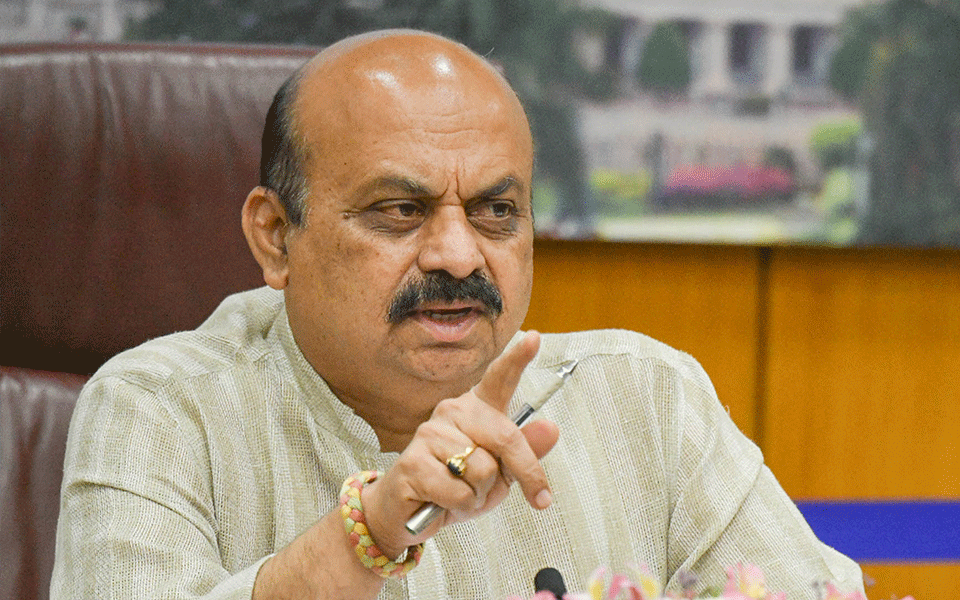Bengaluru(PTI): Karnataka Chief Minister Basavaraj Bommai on Wednesday said his government will re-examine the COVID-19 curbs that are in place, and will take a decision regarding relaxation, including the weekend curfew on January 21.
The Chief Minister, who had tested positive for COVID on January 10, today resumed his day-to-day work from office, after recovery.
"On Friday, I will hold a meeting with experts, and will re-examine the curbs that have been enforced," he said.
Speaking to reporters here, he said, "The COVID numbers are increasing, but it has not put a load on hospitals with very less admissions, attention should be given to OPD (Outpatient Department), with all this, let's see what experts have to say."
Asked whether the weekend curfew will be withdrawn, the CM maintained that all those things will be decided after consulting the experts and going through their report.
He said based on the trends in different countries and states, experts have estimated that the cases may peak in the state by January end and February first week.
To a question, why discussion on relaxing curbs when the cases are expected to peak, he said, "the general feeling that it (infection) is like a flu, and not much hospitalization is taking place, so day-to-day activities can be allowed by following COVID rules. Experts are examining it, they will place things before us on Friday. Following which we will make a decision."
With surge in cases, the Karnataka government had last week decided to extend the existing COVID curbs such as night curfew and the weekend curfew till the end of January.
Bommai, who was infected by COVID and was in home quarantine, from where he was virtually performing official duties and held meetings, today said he has recovered.
"....my quarantine is over and the test has also been done, it has come negative. So from today I have decided to take part in day-to-day work from the office," he said.
Noting that he had held a virtual meeting with Deputy Commissioners of various districts on Tuesday, the Chief Minister said clear instructions have been given to district administrations to increase vaccination where the coverage is low, whether it is first or second dose, or precaution dose.
"Directions have been given to administer precaution dose among health and frontline workers at a fast pace," he said.
With 94 per cent of cases in home isolation now, the health department has been asked to monitor it, by maintaining constant contact with those infected, doing triaging and providing them with medical kits, Bommai said.
In rural areas, it has been decided to restart the 'Vaidyara Nade Hallliyakade' programme to make doctors and ANMs visit homes.
To a query on COVID rules violation by ruling BJP leaders, he said orders have been issued to take necessary legal action against violators, irrespective of who they are or their party affiliation.
"I have already given clear orders, yesterday the Chief Secretary has issued written orders. If anyone violated COVID rules or curbs, action should be taken against them in accordance with law and cases should be registered. There is no question of differentiating based on which organisation or party one belongs to," he said.
Bommai did not wish to make any public comments to a question on the much awaited expansion or reshuffle of his cabinet.
According to BJP sources it is likely, only after assembly elections in five states.
Let the Truth be known. If you read VB and like VB, please be a VB Supporter and Help us deliver the Truth to one and all.
Panaji (PTI): As part of a crackdown against tourist establishments violating laws and safety norms in the aftermath of the Arpora fire tragedy, Goa authorities on Saturday sealed a renowned club at Vagator and revoked the fire department NOC of another club.
Cafe CO2 Goa, located on a cliff overlooking the Arabian Sea at Vagator beach in North Goa, was sealed. The move came two days after Goya Club, also in Vagator, was shut down for alleged violations of rules.
Elsewhere, campaigning for local body polls, AAP leader Arvind Kejriwal said the fire incident at Birch by Romeo Lane nightclub at Arpora, which claimed 25 lives on December 6, happened because the BJP government in the state was corrupt.
An inspection of Cafe CO2 Goa by a state government-appointed team revealed that the establishment, with a seating capacity of 250, did not possess a no-objection certificate (NOC) of the Fire and Emergency Services Department. The club, which sits atop Ozrant Cliff, also did not have structural stability, the team found.
The Fire and Emergency Services on Saturday also revoked the NOC issued to Diaz Pool Club and Bar at Anjuna as the fire extinguishers installed in the establishment were found to be inadequate, said divisional fire officer Shripad Gawas.
A notice was issued to Nitin Wadhwa, the partner of the club, he said in the order.
Campaigning at Chimbel village near Panaji in support of his party's Zilla Panchayat election candidate, Aam Aadmi Party leader Kejriwal said the nightclub fire at Arpora happened because of the "corruption of the Pramod Sawant-led state government."
"Why this fire incident happened? I read in the newspapers that the nightclub had no occupancy certificate, no building licence, no excise licence, no construction licence or trade licence. The entire club was illegal but still it was going on," he said.
"How could it go on? Couldn't Pramod Sawant or anyone else see it? I was told that hafta (bribe) was being paid," the former Delhi chief minister said.
A person can not work without bribing officials in the coastal state, Kejriwal said, alleging that officers, MLAs and even ministers are accepting bribes.





